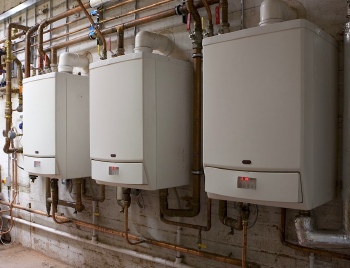Fitting tradition into a low carbon future

Switching to low-carbon heating can be a potentially complex and costly process for both the domestic and commercial sectors. Darran Smith of Alpha Heating Innovation considers the issues involved in making the transition to low-carbon technologies and how traditional heating systems can still find a place in the low-carbon future.
Changing the way we heat our businesses and homes is vital; on that point everyone is agreed. But the approach and means of doing it have varied dramatically over the years. In theory, the advent of the Green Deal should create a more streamlined and uniform methodology to upgrading millions of buildings. However, cost has continued to be a significant concern, with the Golden Rule subject to scrutiny and the proposed interest rates casting long shadows over potential uptake — especially in the domestic market.
It’s easy to be negative about such an ambitious scheme, but the industry must remain realistic about the potential it has to deliver widespread change. The Government is right in saying that this is an ongoing process; it will take time for dependency on gas as the main source of heat to dwindle in favour of more carbon-neutral or renewable technologies. This potential is specifically relevant to the commercial sector, where cost has been one of the main prohibiters to change.
With SMEs accounting for 99% of the 4.8 million businesses in the UK, ensuring the transition to low-carbon heating in this sector is vital to contributing to a reduction in emissions from UK businesses. Therefore, getting past the initial negativity over potential cost is the first hurdle towards this goal; this is where the Green Deal begins to make more sense for businesses. Being able to finance efficiency improvements is much more desirable than an up-front cost.
However, with no confirmation on when the non-domestic Green Deal will be launched and delays to the latest evolution of Part L, businesses are in limbo over any energy efficiency work that could be carried out. Whilst the uncertain situation could be viewed as a stalling point for upgrades to commercial buildings, it can also be viewed as an opportunity to gain a better understanding of the Green Deal and also over how businesses are consuming energy overall.
One of the main differences between the domestic and non-domestic Green Deal will be how assessments are carried out. Owing to the variance in commercial buildings it’s not possible to work to the same assessment method, therefore the non-domestic assessment is predicted to be much more complex. It’s likely to use the same methodology that produces Energy Performance Certificates and include ‘in-use’ energy data from the building. According to a survey carried out by one of the big six energy suppliers, inefficient buildings cost SMEs around £8 billion per year, which represents a huge opportunity in terms of reducing costs and emissions.

However, it is worth noting that there is no direct requirement for energy-efficiency measures to be implemented straight away. The Government has always maintained that the Green Deal is about long-term goals and is here for the duration, hence the possibility that measures would be installed at certain times during a lease — either at breaks in a tenancy or during other major refurbishment works. But, given the latter only really happens every 25 years, is this approach really conducive to driving down emissions from the millions of UK businesses in a timely and effective way?
Green Deal or no Green Deal, upgrading to an efficient HVAC system is still expected to offer the most significant savings, mainly due to the fact that the efficiency levels on older systems can drop to as little as 50%. A large number of cast-iron boilers are still in operation in commercial spaces, so replacing them with high-efficiency, condensing boilers can deliver very real benefits. The advanced technology that now goes into modern high efficiency boilers allows so-called traditional heating systems to work in harmony with renewable technologies such as solar thermal and flue-gas heat recovery, making them much more flexible and adaptable to modern commercial HVAC systems.
In the immediate to short term, it’s unlikely and impractical for commercial businesses to abandon traditional HVAC systems in favour of a fully renewable solution. The transition should be steady and considered, with HVAC remaining a serious consideration for older offices with outdated heating and hot-water systems. Thankfully, as high-efficiency boilers are an approved measure under the non-domestic Green Deal they will continue to play a role in driving down emission levels from millions of commercial buildings.







